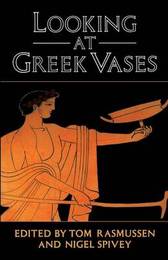
|
Looking at Greek Vases
Paperback / softback
Main Details
| Title |
Looking at Greek Vases
|
| Authors and Contributors |
Edited by Tom Rasmussen
|
|
Edited by Nigel Spivey
|
| Physical Properties |
| Format:Paperback / softback | | Pages:302 | | Dimensions(mm): Height 213,Width 137 |
|
| Category/Genre | Ancient and classical art BCE to c 500 CE |
|---|
| ISBN/Barcode |
9780521376792
|
| Classifications | Dewey:738.3820938 |
|---|
| Audience | | General | | Professional & Vocational | | Tertiary Education (US: College) | |
|---|
| Illustrations |
1 Maps; 105 Halftones, unspecified
|
|
Publishing Details |
| Publisher |
Cambridge University Press
|
| Imprint |
Cambridge University Press
|
| Publication Date |
26 July 1991 |
| Publication Country |
United Kingdom
|
Description
An ancient Greek vase is a difficult object for the non-expert to come to terms with. Faced with rows of apparently undifferentiated black, red and buff pots, he or she is at a loss as to where to begin. Greek vases are treated as objets d'art in the modern world, but how much were they worth in the ancient? They are often used to demonstrate 'the Greek genius' and aspects of ancient Greek society, but why do many of them carry Eastern motifs, and why do so many turn up in Italy? Why were the Greeks not content with simple patterns on their pottery? What did the pictures on the pots mean to them? Why should a vase depict a scene from a play? These are the sorts of questions that this book attempts to answer. As the title implies, it is a series of 'looks' at Greek vases, offering suggestions on how to read the often complex images they present, and also explaining how they were made and distributed. Chapters have been contributed by a distinguished team of scholars, who have written with a wide readership in mind. The book is intended to be read by students of Greek art in universities and schools and also by museum-goers and any one who feels curiosity about the society and history of ancient Greece.
Reviews' ... an excellent book, presenting ... a wide variety of viewpoints from which ancient pottery can be studied.' Martin Kilner, Classical Views
|